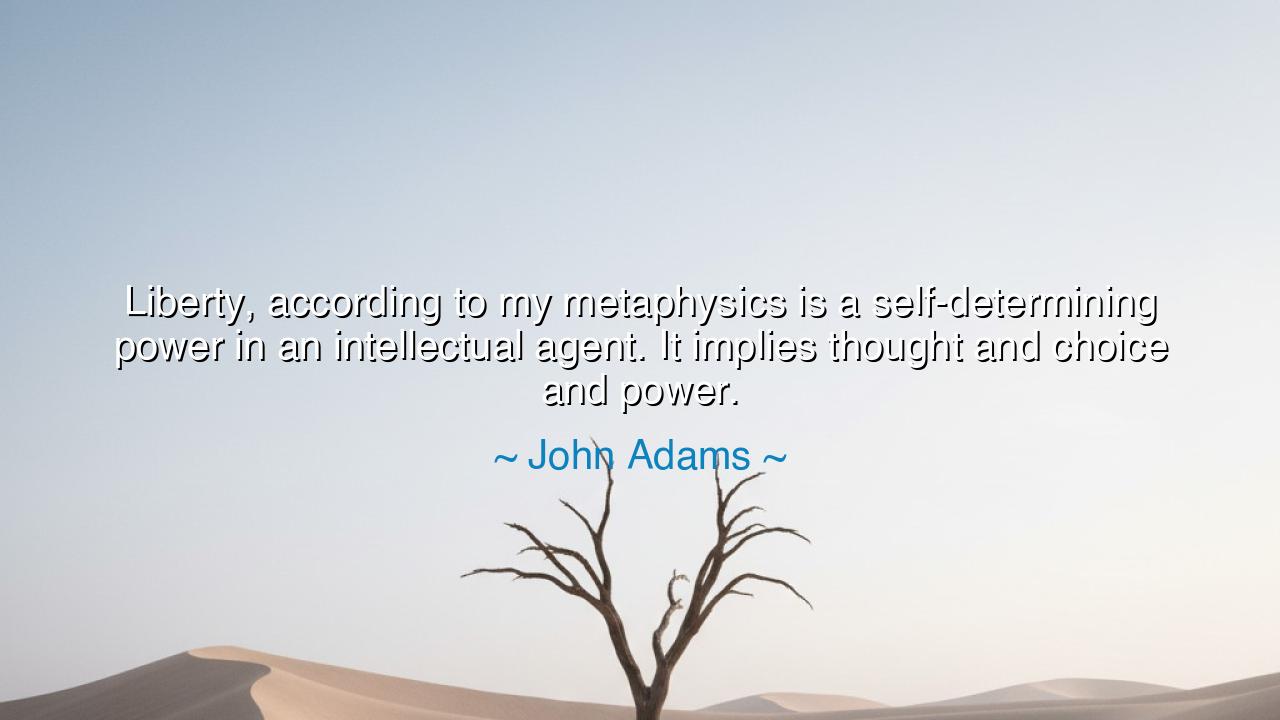
Liberty, according to my metaphysics is a self-determining power
Liberty, according to my metaphysics is a self-determining power in an intellectual agent. It implies thought and choice and power.






The words of John Adams—“Liberty, according to my metaphysics is a self-determining power in an intellectual agent. It implies thought and choice and power.”—are carved from the bedrock of reason and devotion to the human spirit. For Adams saw liberty not as license to do as one pleases, but as the sacred gift of self-determination—the power of a thinking soul to govern itself through wisdom, reason, and will. In this vision, liberty is no accident of circumstance, but the highest expression of human dignity.
This utterance reveals the union of thought and choice. To be free, one must not merely act, but act with reason; not merely choose, but choose with understanding. For Adams, liberty is inseparable from the intellect—it is not chaos, but order born from within. It is the mind shaping its own destiny, rising above impulse and fear to declare: “I am the master of myself.”
History offers us the tale of the American Revolution, where Adams himself labored with quill and word to defend the right of a people to govern themselves. The colonies sought not anarchy, but the power to deliberate, to decide, to shape laws by their own consent. Just as Adams defined liberty as the marriage of power and thought, so too did the Revolution strive to prove that a nation could be both free and governed, both self-determining and ordered.
The quote is also a warning against mistaking liberty for indulgence. Without thought, freedom dissolves into chaos; without choice, it becomes tyranny. True liberty requires responsibility, for to wield power without reason is to invite destruction. Thus Adams’ words remind us that liberty, rightly understood, is not merely a gift, but a discipline, requiring constant vigilance of the mind and strength of the will.
Let this wisdom be carried to future generations: liberty is not a crown bestowed from above, but a fire kindled within each intellectual agent. It is sustained by thought, guided by choice, and empowered by the will to act rightly. Guard it well, for to neglect reason is to lose freedom, and to abandon choice is to fall into bondage. As Adams teaches, true liberty is the power of the soul to shape its own destiny, and there is no greater power under heaven.






LVLe Li Vai
There’s something almost spiritual in how Adams frames liberty—as a 'self-determining power' rooted in thought and will. It’s not about external permissions but inner mastery. I can’t help but ask: how many of us actually exercise that kind of liberty? We might have legal freedoms, but are we mentally and morally self-directed? This idea makes freedom sound like both a gift and a lifelong discipline.
VQLa Vinh Quoc
Adams’s take on liberty feels timeless, especially today when people often equate freedom with doing whatever they want. His focus on self-determination and intellect reminds us that freedom without responsibility can quickly devolve into chaos. It makes me think about how education and moral reasoning are essential to sustaining liberty in any society. Can a nation remain free if its citizens stop thinking deeply?
MKMinh Khang
I find this definition of liberty fascinating because it ties freedom to consciousness and reason. Adams implies that liberty is an active state, not a passive right. But does that mean only rational individuals can experience true liberty? What about those constrained by social or economic circumstances—are they less 'free' even if they live in a democratic society? It’s a challenging but necessary question.
ANThanh An Nguyen
This quote feels like a profound philosophical reflection on freedom. John Adams seems to argue that liberty isn’t just the absence of restraint, but a deeply intellectual process involving awareness and choice. It makes me wonder—can someone truly be free without the ability to think critically or make informed decisions? Maybe real liberty requires both education and moral grounding, not just political independence.